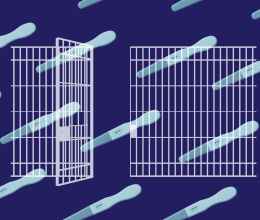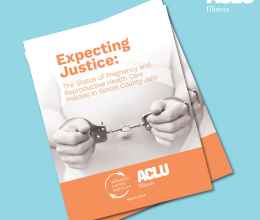
Melissa was pregnant at the time of her arrest in 2006; she gave birth in shackles. Melissa was in shackles two days prior to giving birth to her son. As she delivered her baby, her wrists were handcuffed to the bed, a leg iron chained her to the stirrups, and a male sheriff deputy sat in the room, watching TV, as Melissa wailed in pain. This is just one of many stories of incarcerated women in Illinois who have suffered the harm and indignity of giving birth in chains.
This practice of using restraints on pregnant prisoners had technically been banned in Illinois in 2000, but the ban has not been enforced. Women charged with nonviolent crimes were being placed in leg irons, with their hands cuffed to chain belts when brought to the hospital. Chicago Legal Advocacy for Incarcerated Mothers (CLAIM) spearheaded a legislative initiative to enforce the ban, and enlisted the ACLU of Illinois, along with a number of partner organizations, to help to rally support for a bill that sought to put an end to the shackling of women in Cook County prisons.
Last week, there was good news in this area. The Senate passed House Bill 1958, which now awaits the Governor’s signature.
When Illinois passed its anti-shackling law in 2000, the original statute did not define labor. Corrections officials maintained that labor refers only to the actual delivery, and not the hours and sometimes days leading up to labor. This resulted in women being shackled for unnecessarily long periods of time. The new bill provides clear definitions of words like “labor,” “restraints,” and “prisoner,” to name a few, that will help guide corrections officials and keep women safe. The original statute did not specify when restraints could or could not be used. This resulted in women being shackled not only during labor, but also throughout her pregnancy, and during post-partum recovery. The new bill bans the shackling and restraint of pregnant prisons throughout their pregnancy.
There are some extraordinary circumstances that might indicate a need for restraints in order to ensure safety, and the bill outlines specific exceptions for those instances. If a woman is in danger due to a psychological or medical disorder, restraints may be used. In order to encourage transparency in the system of monitoring pregnant prisoners, the bill outlines measures for reporting those instances where restraints were used and to record the details of those instances.
In defining new terms, outlining exceptions, and requiring transparency, the new anti-shackling law protects the rights of all persons within the Cook County detention system, who are involved in the process of pregnancy during incarceration. Perhaps the most pivotal result of this new law will be when pregnant prisoners can maintain a sense of dignity and pride in experiencing life’s greatest miracle, even if it is behind bars.
If you live in Illinois you can call Gov. Quinn at (217) 782-0244 and tell him you support the bill!




